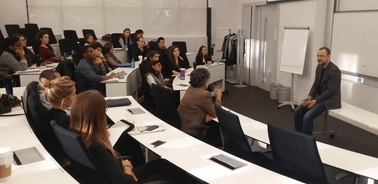- Home
- Ie Master In International Relations Seminar With Prof. Peter Neumann, Terrorism And Security Expert
IE Master In International Relations seminar with Prof. Peter Neumann, terrorism and security expert

On October 22nd, Peter Neumann, Director, International Center for the Study of Radicalization (ICSR), King’s College addressed the IE Master in International Relations students in a very interesting exchange on the threat of terrorism, violent radicalization and ISIS. Prof. Neumann started off the seminar by stating that terrorism kills less people every year than traffic accidents or being struck by a bolt of lightning. This being said, terrorism is much more pernicious in that its impact goes beyond just violence. To illustrate this, Peter Neumann gave 3 examples: Tunisia, Syria/Iraq and Europe today.
- Tunisia until recently was hailed as one of the success stories of the Arab Spring yet just a few months ago its leaders insisted it was on the brink of collapse. How so? Two successive acts of terrorism (the attack of the Museum in Tunis and subsequent attack at a XXX beach resort) pretty much destroyed the tourism industry in Tunisia. Tourism accounts for 35% of Tunisia’s GDP. This is a clear example of how terrorism (that in fact killed “just” 80 to 90 people) had a crippling effect on the Tunisian economy.
- Syria/Iraq: We are in the midst of a historical transformational period in the Middle East comparable to Europe in 1916. There is a lot of chaos and instability and no one has a clear vision of what the outcome of this upheaval will be. The presence of the Islamic State has complicated the situation considerably. What is most striking is that the group has engaged in genocide, mass atrocities and normalized practices that were until now completely extinct. They have reintroduced human slavery and an ancient tax on non-Muslims as a way to generate revenues. The reintroduction and normalizing of these previously disused practices is extremely disturbing.
- Europe: According to Peter Neumann, we will see a rise of terrorist attacks in Europe but on a small scale such as the attacks in Paris at the Charlie Hebdo HQ or the attacks in Copenhagen or in the TGV between Brussels and Paris. The impact of these attacks will be to strengthen the already rising far right parties in Europe as we can see I Sweden, Denmark and in France with Marine Le Pen’s National Front. This will have a strong impact on European societies and will lead to discrimination against minorities and a backlash against immigrants, such as the one we are currently seeing today with Syrian refugees. This will threaten the pluralistic, multiethnic, tolerant social fabric that Europe currently prides itself in.
The above introductory remarks on terrorism were followed by a Q&A period in which students asked what the prospects for Syria were, how ISIS funded itself and what the best strategy to eradicate or contain ISIS was. The exchange with Prof. Neumann was a preview of the 2-day “MADRID +10: Policy Dialogue on Preventing and Countering Violent Extremism” that took place on Oct. 27 & 28. Prof. Neumann was the principal content coordinator of the symposium. The conference gathered over 200 leading experts, opinion shapers, former heads of state, academics, civil society and NGOs around the themes of prevention of violent extremism and radicalization. It was organized by the World Leadership Alliance – Club de Madrid is an independent and non-profit organization comprised of 102 former heads of democratic states and governments from 67 countries.